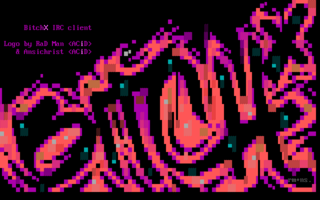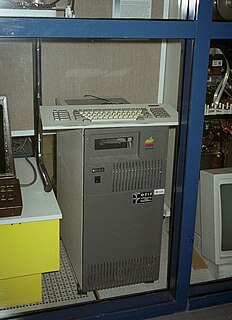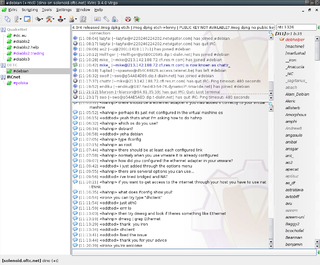
HyperCard is a software application and development kit for Apple Macintosh and Apple IIGS computers. It is among the first successful hypermedia systems predating the World Wide Web.

BitchX is a free IRC client and has been considered to be the most popular ircII-based IRC client. The initial implementation, written by "Trench" and "HappyCrappy", was a script for the IrcII chat client. It was converted to a program in its own right by panasync. BitchX 1.1 final was released in 2004. It is written in C and is a TUI application utilizing ncurses. GTK+ toolkit support has been dropped. It works on all Unix-like operating systems, and is distributed under a BSD license. It is originally based on ircII-EPIC and eventually it was merged into the EPIC IRC client. It supports IPv6, multiple servers and SSL and a subset of UTF-8 with an unofficial patch.

HexChat is an Internet Relay Chat client, forked from XChat. It has a choice of a tabbed document interface or tree interface, support for multiple servers, and numerous configuration options. Both command-line and graphical versions were available.

Internet Relay Chat (IRC) is an application layer protocol that facilitates communication in the form of text. The chat process works on a client/server networking model. IRC clients are computer programs that users can install on their system or web based applications running either locally in the browser or on a third party server. These clients communicate with chat servers to transfer messages to other clients. IRC is mainly designed for group communication in discussion forums, called channels, but also allows one-on-one communication via private messages as well as chat and data transfer, including file sharing.
The history of macOS, Apple's current Mac operating system originally named Mac OS X until 2012 and then OS X until 2016, began with the company's project to replace its "classic" Mac OS. That system, up to and including its final release Mac OS 9, was a direct descendant of the operating system Apple had used in its Macintosh computers since their introduction in 1984. However, the current macOS is a Unix operating system built on technology that had been developed at NeXT from the 1980s until Apple purchased the company in early 1997.

Mac OS 9 is the ninth and last major release of Apple's classic Mac OS operating system. Introduced on October 23, 1999, it was promoted by Apple as "The Best Internet Operating System Ever", highlighting Sherlock 2's Internet search capabilities, integration with Apple's free online services known as iTools and improved Open Transport networking. While Mac OS 9 lacks protected memory and full pre-emptive multitasking, lasting improvements include the introduction of an automated Software Update engine and support for multiple users.

Bersirc is a discontinued open-source Internet Relay Chat client for the Microsoft Windows operating system. Linux and Mac OS X versions were "in development". Bersirc uses the Claro toolkit, which aims to provide an interface to native windowing systems and widgets on all operating systems. Microsoft .NET and Qt toolkit ports were also planned. The final version of Bersirc was 2.2.14.

System 7, codenamed "Big Bang", and also known as Mac OS 7, is a graphical user interface-based operating system for Macintosh computers and is part of the classic Mac OS series of operating systems. It was introduced on May 13, 1991, by Apple Computer, Inc. It succeeded System 6, and was the main Macintosh operating system until it was succeeded by Mac OS 8 in 1997. Features added with the System 7 release included virtual memory, personal file sharing, QuickTime, QuickDraw 3D, and an improved user interface.

Internet Explorer for Mac OS X is a proprietary web browser developed by Microsoft for the Macintosh platform to browse web pages. Initial versions were developed from the same code base as Internet Explorer for Windows. Later versions diverged, particularly with the release of version 5 which included the cutting edge, fault-tolerant and highly standards-compliant Tasman layout engine.
Snak is a shareware Internet Relay Chat (IRC) client written by Kent Sorensen for the Macintosh platform. Snak is distributed as shareware and can be freely used and evaluated for 30 days at no charge. After the 30-day evaluation period has ended, the program will quit after 15 minutes of use, and a registration key must be purchased. Versions up to 4.12 runs on both Mac OS 9 and Mac OS X while version 5 and newer only supports Mac OS X. The program is Intel Only as of version 5.3.4. The program is not fully compatible with current macOS versions and is no longer supported, with the developer stating that he is unable to create new versions due to the deprecation of the Carbon libraries. On October 10, 2018, Snak was declared abandonware by the developer and made freeware with a license key published on the project's web site.

Hotline Communications Limited (HCL) was a software company founded in 1997, based in Toronto, Canada, with employees also in the United States and Australia. Hotline Communications' main activity was the publishing and distribution of a multi-purpose client/server communication software product named Hotline Connect, informally called, simply, Hotline. Initially, Hotline Communications sought a wide audience for its products, and organizations as diverse as Avid Technology, Apple Computer Australia, and public high schools used Hotline. At its peak, Hotline received millions of dollars in venture capital funding, grew to employ more than fifty people, served millions of users, and won accolades at trade shows and in newspapers and computer magazines around the world.
The following tables compare general and technical information between a number of IRC client programs which have been discussed in independent published literature.
Timbuktu is a discontinued remote control software product originally developed by WOS Datasystems. Remote control software allows a user to control another computer across the local network or the Internet, viewing its screen and using its keyboard and mouse as if he or she were sitting in front of it. Timbuktu is compatible with computers running both Mac OS X and Windows.
Omnis Studio is a rapid application development (RAD) tool that allows programmers and application developers to create enterprise, web, and mobile applications for Windows, Linux, and macOS personal computers and servers across all business sectors.
Homer, from Blue Cow Software, was an IRC client for Apple Macintosh computer systems during the 1990s, written by Tob Smith, and distributed as shareware. System 7 or later of the classic Mac OS was required, as was MacTCP. It featured an icon view of users in a channel, which would animate when the user posted to the channel. It also provided notification of incoming CTCP Finger commands. Ircle included and extended this feature, "face files" to larger images. A late version of Homer reportedly allowed collaborative drawing across the network.

Linkinus was a shareware IRC client for Mac OS X and iOS. It has an Aqua-style user interface, and allows Cocoa plugins, AppleScript, and Growl notifications to be used. Linkinus also features embedded media, although some users have complained that this can cause the program to slow down, or even crash, especially on slow computers. Linkinus also has other features similar to those of other IRC clients, such as multitasking and the ability to change between different user interface styles.

KVIrc is a graphical IRC client for Linux, Unix, Mac OS and Windows. The name is an acronym of K Visual IRC in which the K stands for a dependency to KDE, which became optional from version 2.0.0. The software is based on the Qt framework and its code is released under a modified GNU General Public License.

The classic Mac OS is the series of operating systems developed for the Macintosh family of personal computers by Apple Inc. from 1984 to 2001, starting with System 1 and ending with Mac OS 9. The Macintosh operating system is credited with having popularized the graphical user interface concept. It was included with every Macintosh that was sold during the era in which it was developed, and many updates to the system software were done in conjunction with the introduction of new Macintosh systems.









